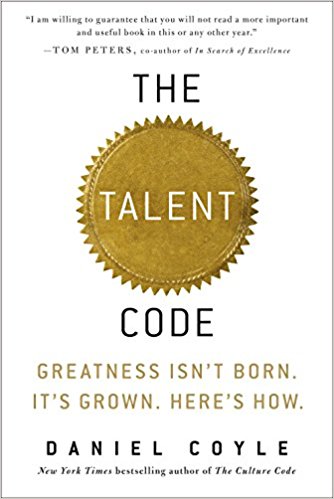The Talent Code Summary
6 min read ⌚
 MicroSummary: Using recent neuroscientific findings and an in-depth sports know-how, bestselling author Daniel Coyle cracks “The Talent Code” to uncover that, rather than born, greatness is grown, being a well-baked product of three ingredients: deep practice (because it makes perfect), ignition (because you need motivation to get up once you fail), and master coaching (because, what are teachers for?).
MicroSummary: Using recent neuroscientific findings and an in-depth sports know-how, bestselling author Daniel Coyle cracks “The Talent Code” to uncover that, rather than born, greatness is grown, being a well-baked product of three ingredients: deep practice (because it makes perfect), ignition (because you need motivation to get up once you fail), and master coaching (because, what are teachers for?).
Greatness Isn’t Born. It’s Grown. Here’s How.
Remember when we said that some parts of you are nature and others nurture?
Well, Daniel Coyle is not exactly the type of guy who’d agree to this straight away. So, he has made his own personal research on the subject.
In “The Talent Code” he reveals his considerably different findings.
And we reveal the most important among them.
Who Should Read “The Talent Code”? And Why?
Have you ever wondered why some nations are consistently good at some things? For example, why almost all former world chess champions were Soviets, or why the Chinese are ever so dominant in table tennis?
Well, “The Talent Code” claims to have the answers for you. And they will certainly interest you, even if you merely want to impress your friends with some popular science wisdom. They will even be of practical value to you, if you are a coach, an athlete, musician – or, really, anything which requires from you a lot of practice.
About Daniel Coyle
 Daniel Coyle is a contributing editor for “Outside” magazine, and a New York Times bestselling author. In 2012, he won the William Hill Sports Book of the Year Prize, for the Tour de France “game ender”, “The Secret Race,” a book he co-wrote with Tyler Hamilton.
Daniel Coyle is a contributing editor for “Outside” magazine, and a New York Times bestselling author. In 2012, he won the William Hill Sports Book of the Year Prize, for the Tour de France “game ender”, “The Secret Race,” a book he co-wrote with Tyler Hamilton.
He has also authored “The Little Book of Talent,” “Hardball,” and the novel “Waking Samuel.”
You can find more about him and his hot-off-the-oven chart-topper, “The Culture Code,” at: http://danielcoyle.com/.
“The Talent Code Summary”
It’s not like we haven’t said this a hundred times before:
Your brain is an incredible organ!
And we’re just starting to figuring out its inner workings.
One of these new neuroscientific findings is the basis of Daniel Coyle’s “The Talent Code.” Namely, the recent discovery that the old “practice makes perfect” adage has a scientific basis.
How?
Well, scientists found out that we remember some things better than other things because the neural circuits which ingrain these things both in our brain and body are better built! Specifically, we’re talking about myelin, the substance which surrounds some nerve fibers.
Originally thought to be a mere electrical insulator, it has now been discovered that it’s also what determines a nerve signal’s speed and precision.
In short:
The more myelin around a neural pathway, the better your memory and skill of the information the neural pathway keeps.
And it seems that, contrary to some people’s opinions, overpractice does work, and we have a material proof of this: it’s what piles up myelin on a nerve fiber.
And it’s practice what truly makes the difference! It forms a large part of the explanation of some of the seeming mysteries about the geniuses of history.
Remember when we talked about genius clusters?
Back then, we explained to you that these are places that have gone in a genius-overload mode There, for no apparent reason, quite a few brilliant people are born every single generation. Whether it’s Ancient Athens, Renaissance Florence, or turn-of-the-century Vienna (twice!), for some reason, history teaches us that geniuses beget geniuses.
Why?
Daniel Coyle’s research reaches the same conclusion Eric Weiner did after a long trip around the world. Namely, geniuses bring about geniuses, not because of genes, but because they have developed a method to acquire some skill and a community to share their knowledge.
There you have it: we’ve cracked the talent code!
And the code consists of three elements: deep practice, ignition, and master coaching.
In short, deep practice means training for an ultramarathon in order to win the 10,000-meter run. It’s going deep, and going hard.
For example, every second Brazilian is a great soccer player, because ever since his early childhood he has played futsal on a daily basis. And futsal is like football – with a twice as heavy ball on a twice as smaller field. After mastering the futsal skills, playing soccer comes like a breeze.
And how do you actually master them?
Well, deep practice consists of three parts.
First of all, it’s a chunked-up experience. Splitting the skill you need to learn in smaller chunks, gives you two advantages: it allows you to perfect them one-by-one, and gives you a constant sense of accomplishment which drives you forward.
Then, it’s about constant improvement: repeating means learning, and learning gives the space of trying something new, above the limits of the acquired knowledge. No matter how good you get, challenge yourself to make the next step.
Finally, deep practice is about time. Success doesn’t come easy. In fact, on average, you’ll need about 10,000 hours to master a skill.
Already feeling discouraged?
That’s because you don’t have a motivation. This is the second element of the talent code. Daniel Coyle refers to it as ignition. Brazilian soccer players are good because they practice so much, but also because they are motivated by the knowledge that soccer can get them the life they’ve craved for. In fact, almost all Brazilian superstars now earning millions grew up in poverty.
The third element of talent is an external component. It has to do with motivation, but with the one only a knowledgeable outsider can provide.
Yes, we’re talking about a mentor, about a master coach.
Key Lessons from “The Talent Code”
1. (Deep) Practice Makes Perfect – and Science Says So
2. In Order to Practice Hard, You Need Your Ignition
3. No Matter How Good You Are, You Need a Coach
(Deep) Practice Makes Perfect – and Science Says So
Deep practice is how we remember. Science has found out that when we repeat a thing, the neural pathway gets a thicker myelin layer. And it’s the myelin which guarantees that the information will travel both faster and more precisely the next time you need it.
Want to acquire some skill?
Start practicing now!
In Order to Practice Hard, You Need Your Ignition
Practice makes perfect – but only after thousands of imperfect attempts. And utter failures. In order to get up after each of these times – you need some grit. And a lot of motivation.
Just think about it this way:
In 1998, at just 20 years of age, Se-ri Pak became the first South Korean golfer to win the U.S. Women’s Open. Two decades later, female K-golfers dominate the sport.
Surely, they were good before 1998 as well.
But, they weren’t motivated enough.
No Matter How Good You Are, You Need a Coach
The third element of your talent is someone who is not you. Of course, it’s your coach. He can be one of two types: an average one who ignites you to reach your goal, or a skillful genius to pass his method over to you.
In either case, his objective is to teach you to win.
And with a lot of practice, he just might.
Like this summary? We’d Like to invite you to download our free 12 min app, for more amazing summaries and audiobooks.
“The Talent Code” Quotes
Skill is a cellular insulation that wraps neural circuits and that grows in response to certain signals. Share on X Struggle is not an option: it's a biological requirement. Share on X Education is not the filling of a pail, but the lighting of a fire. (via Plutarch) Share on X Don't look for the big, quick improvement. Seek the small improvement one day at a time. Share on X To sum up: it's time to rewrite the maxim that practice makes perfect. The truth is, practice makes myelin, and myelin makes perfect. Share on XOur Critical Review
Let’s face it: whether we want it or not, it’s very probable that, as long as we live, our brain will remain a mystery to us. And with it, talent itself. “The Talent Code” is a nice way to reveal some of its alluring secrets. But, just like few other books on the subject, it isn’t necessarily deep.
Because, it boils down to a very simple lesson: in order to succeed, you need a good coach, a great motivation and a lot, a lot of work.
But, we guess you knew the moral of that story already.
Emir is the Head of Marketing at 12min. In his spare time, he loves to meditate and play soccer.







